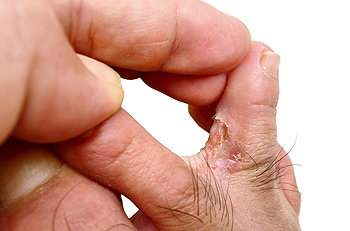 If you have ever experienced a corn on your toe, you are most likely familiar with the pain and discomfort this may typically cause. It may appear as a small hardened bump on the top of the toes, which is referred to as a hard corn. It is generally the result of increased friction the feet and toes endure, and this may originate from wearing shoes and socks that are too tight. Additionally, another type of corn that is known as a soft corn is most often found in between the toes. This occurs when excessive sweat collects around the toes, and the center of the corn may become soft. Corns are known to be a painful ailment, and consulting with a podiatrist who can properly treat this condition may be beneficial in relieving the pain and discomfort that is associated with it.
If you have ever experienced a corn on your toe, you are most likely familiar with the pain and discomfort this may typically cause. It may appear as a small hardened bump on the top of the toes, which is referred to as a hard corn. It is generally the result of increased friction the feet and toes endure, and this may originate from wearing shoes and socks that are too tight. Additionally, another type of corn that is known as a soft corn is most often found in between the toes. This occurs when excessive sweat collects around the toes, and the center of the corn may become soft. Corns are known to be a painful ailment, and consulting with a podiatrist who can properly treat this condition may be beneficial in relieving the pain and discomfort that is associated with it.
Corns can make walking very painful and should be treated immediately. If you have questions regarding your feet and ankles, contact Dr. Mark Gagnon of Advanced Podiatry. Our doctor will treat your foot and ankle needs.
Corns: What Are They? And How Do You Get Rid of Them?
Corns are thickened areas on the skin that can become painful. They are caused by excessive pressure and friction on the skin. Corns press into the deeper layers of the skin and are usually round in shape.
Ways to Prevent Corns
There are many ways to get rid of painful corns such as:
- Wearing properly fitting shoes that have been measured by a professional
- Wearing shoes that are not sharply pointed or have high heels
- Wearing only shoes that offer support
Treating Corns
Although most corns slowly disappear when the friction or pressure stops, this isn’t always the case. Consult with your podiatrist to determine the best treatment option for your case of corns.
If you have any questions please feel free to contact one of our offices located in Crestwood, Orland Park, and Summit, IL . We offer the newest diagnostic and treatment technologies for all your foot and ankle needs.
